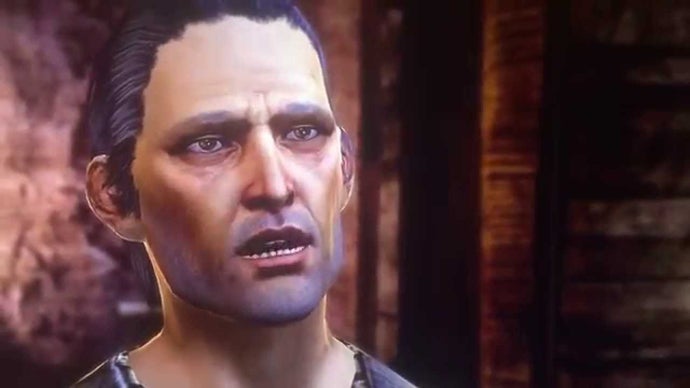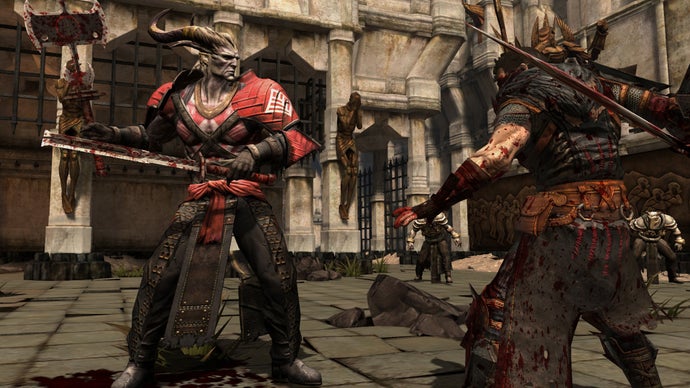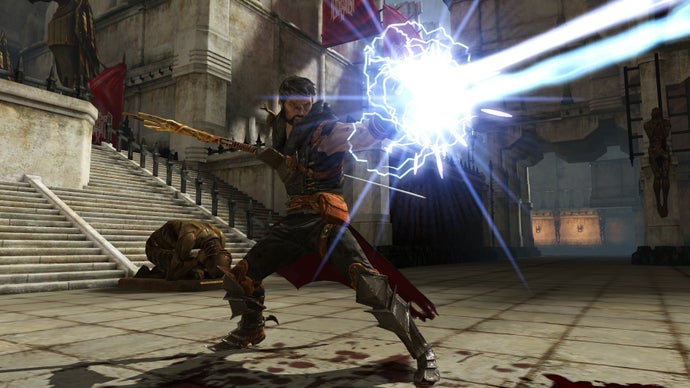Be warned: this piece contains spoilers for Dragon Age 2.
As someone with South Asian heritage, I’m typical in that family is an essential part of my life story. I grew up amidst cousins and aunts, weddings and birthdays, weekly visits to my uncle and great uncles after school, and weekend drives with my grandmother as I sat in the back of my father’s car, clinging to a book.
It’s made me think. So many role-playing games I have encountered focus on gathering friends and romantic interests around the protagonist, but how much focus do they give to your character’s family members? There are lots of games about found families, but could I think of one that was about siblings and parents and grandparents?
Then I hit on it. BioWare’s Dragon Age 2 actually ponders the family one is born into, and the complex dynamics within that family. It’s a huge part of the game. And it does this in ways that I haven’t seen before when playing games. As a result, Dragon Age 2 has a more intimate and even novelistic quality than both of the other, more celebrated, Dragon Age games. On that note, the story itself is actually narrated by a novelist who is one of your party members; they’re named Varric and they’re also a rogue.

Varric’s story begins as your character, Hawke, along with your mother Leandra and your two siblings, Carver and Bethany, flee your home during a battle with monsters named Darkspawn. In the fight, one of your siblings is killed. If you play as a mage, your sister Bethany dies, and if you play as the other classes, your younger brother Carver is apparently the one to die instead. (As someone who usually plays as a mage, the sibling that survived in my playthrough was Carver, but I’m intrigued to do another playthrough with Bethany.) You manage to get the rest of your family to relative safety, a city named Kirkwall. It’s a city where your mother has an inheritance and a respected family name. Now refugees, you reach the gates and manage to meet your uncle Gamlen, hoping for a warm welcome.
When you first meet Gamlen, everything about him exudes sleaziness. He is evasive about Leandra’s inheritance, simply stating that it is now gone to pay off a debt. And he has no qualms with encouraging you to work with shady associates to pay off your own debt for getting into Kirkwall (a full year of ‘indentured servitude’). In the meantime, Gamlen will let you stay in his house, which is an extremely run down, cramped sort of shack in the slum area of the city. Later, Gamlen starts implying that Leandra should be paying him rent, which becomes shameful when it is revealed that he has taken all the aforementioned money that was left to her by their parents. When you confront him about this, he actually sounds triumphant rather than regretful. Family tensions! It’s as if the money is what he is owed after a lifetime of being ignored by his parents.
BioWare never shies away from the complexity and contradictions of family dynamics, however. In the latter part of the game, when Leandra is kidnapped, you see another side to Gamlen. He’s clearly worried, despite the issues between them. After she dies, Gamlen is devastated, and he’s actually supportive towards you. But he also has a troublingly realistic reaction when, learning that a mage is to blame for Leandra’s death, he angrily rants about all mages and all magic until you calm him down.

It all adds up to a nuanced portrait, and a nuanced relationship. When you interact with Gamlen later, you still feel bitterness on Hawke’s behalf at how he has treated your mother, but you can’t help but connect with him on at least a limited level. (There is even a late-game quest where you can reunite Gamlen with his daughter, who has never known him.) In the end, Gamlen’s curiously memorable to me because he feels so real. Timothy Watson, the voice actor for Gamlen, does an excellent job switching between Gamlen’s usual harshness and his more sympathetic moments. Sometimes he even combines them when the writing requires it. But it’s the context of family struggles and frustrations the game provides that makes Gamlen singular as a creation.
What about Carver, your character’s younger brother? Carver is both insufferable and amusing. He makes sour comments on a regular basis, usually comes up with ideas I disagree with, and is generally not a pleasant sort. He’s petty, jealous, and rude, but he’s also your little brother, and you cannot help feeling a little protective towards him all the same, especially when he opens up about things. He usually doesn’t get along well with Hawke, mainly because he feels overshadowed; his relationship with you is thus an unfortunate mirror to the relationship between Gamlen and Leandra. (It’s probably no coincidence that Varric’s most significant conflict is with his own sibling too, the unlikeable Bartrand.) But again, it’s the family connection that elevates all of this. You have more at stake when your family are involved, so you see more in them and are more willing to explore the reasons for the annoying or hurtful stuff they do.
A particularly interesting thing the game does with all this family business is to present the player with a crucial choice near the end of the first act. You’re all set to go on a risky but promising expedition when your mother turns up, and pleads with you not to take Carver along. Suddenly you’re in a position, as both a son and older sibling, where you have to consider if you want to put your mother’s mind at ease, when she’s already distraught over losing her daughter, and keep your brother safe, knowing he’ll dislike you even more than before, or take him along and put him in danger. The idea of family, the context of family, is doing all the work here to make this choice really count. If you tell Carver to stay he will of course bristle, but Leandra will relax. If you take him with you, however, I assume that it could show him you trust him and pave the way for better relations between the two of you.

As for me? I chose to order him to stay, mainly for Leandra’s sake. If you do take him with you, he apparently ends up either being contaminated by Darkspawn and forced into a group known as the Grey Wardens, or else he actually dies. If you leave him behind, as I did, he decides to join The Templars, an order that actively hunts your kind (you’re regarded as one of the ‘apostate’ mages), although Carver says he won’t turn you in, and in my game he stuck to his word. How kind.
From this fascinating foundation, the game unfortunately seems to neglect both Leandra and Carver as the story goes on; Leandra only has a small role until her death, and Carver, as mentioned, vanishes to become a Templar or Grey Warden after the first act, and then doesn’t show up much at all for a while. Oddly, he doesn’t even have much of a reaction to his mother’s death when he learns of it. Maybe these issues come down to the punishingly short time frame the game was created within, which, as is noted in Jason Schreier’s book, Blood, Sweat, and Pixels, was under two years.
Even so, Dragon Age 2 still manages to capture family in a way that I recognise, because it shows the different facets to life you get from being thrown together with siblings and parents. It gives us the love between son and mother, with Hawke and Leandra. (Even little elements feel realistic here, like when Leandra wonders about getting Hawke married.) It gives us the troubled but still caring dynamic between siblings, with Hawke and Carver. And it explores the distaste one can have for a morally bankrupt family member and the need to still maintain a bond with them, with Hawke and Gamlen. I love all three Dragon Age games: Origins feels the most cohesive, and Inquisition is probably the most dazzling. But Dragon Age 2 is the one that feels the most personal, and it’s because of that central conceit: it keeps it all in the family.
